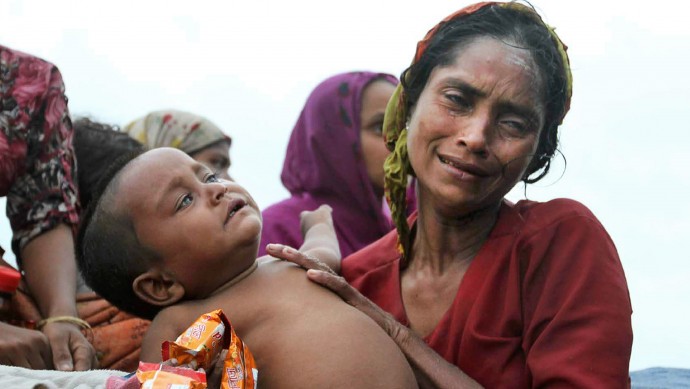Myanmar's Security Forces Raped And Assaulted Rohingya Women: HRW

NEW DELHI: Myanmar’s government forces committed rape and other sexual violence against ethnic Rohingya women and girls as young as 13 during security operations in northern Rakhine State in late 2016, rights group Human Rights Watch has said. “The Burmese government should urgently endorse an independent, international investigation into alleged abuses in northern Rakhine State, including into possible systematic rape against Rohingya women and girls,” the group urged.
In a statement released this week, the rights group highlighted persecution faced by the minority Rohingya community, who are denied citizenship rights in Myanmar and continue to face threats, intimidation and violence. “Burmese army and Border Guard Police personnel took part in rape, gang rape, invasive body searches, and sexual assaults in at least nine villages in Maungdaw district between October 9 and mid-December. Survivors and witnesses, who identified army and border police units by their uniforms, kerchiefs, armbands, and patches, described security forces carrying out attacks in groups, some holding women down or threatening them at gunpoint while others raped them. Many survivors reported being insulted and threatened on an ethnic or religious basis during the assaults,” HRW said.
“These horrific attacks on Rohingya women and girls by security forces add a new and brutal chapter to the Burmese military’s long and sickening history of sexual violence against women,” said Priyanka Motaparthy, senior emergencies researcher. “Military and police commanders should be held responsible for these crimes if they did not do everything in their power to stop them or punish those involved.”
Between December 2016 and January 2017, Human Rights Watch researchers in Bangladesh interviewed 18 women, of whom 11 had survived sexual assault, as well as 10 men. Seventeen men and women, including some women who survived assaults, witnessed sexual violence, including against their wives, sisters, or daughters. Altogether Human Rights Watch documented 28 incidents of rape and other sexual assault. Some incidents involved several victims. A report released by the United Nations Office of the High Commission for Human Rights (OHCHR) on February 3 found that more than half of the 101 women UN investigators interviewed said they were raped or suffered other forms of sexual violence. The report, based on a total of 204 interviews, concluded that attacks including rape and other sexual violence “seem[ed] to have been widespread as well as systematic, indicating the very likely commission of crimes against humanity.”
After attacks by Rohingya militants on border police posts on October 9, 2016, the Burmese military undertook a series of “clearance operations” in northern Rakhine State, HRW says. It adds that security forces summarily executed men, women, and children; looted property; and burned down at least 1,500 homes and other buildings. More than 69,000 Rohingya fled to Bangladesh, while another 23,000 have become internally displaced in Maungdaw district.
The rights group spoke to several eyewitnesses, including women who described how soldiers surrounded their villages or homes, then gathered the villagers in an outdoor area, separating men from women, and detained them for up to several hours. Soldiers often shot villagers, and raped and gang raped women and girls, the report states. “Ayesha,” a Rohingya woman in her 20s, told Human Rights Watch: “They gathered all the women and started beating us with bamboo sticks and kicking us with their boots. After beating us, the military took [me and] 15 women about my age and separated us.… [The soldiers] raped me one by one, tearing my clothes.”
Further, eyewitnesses told HRW about how during raids on homes, security forces frequently beat or killed family members and raped the women. “Noor,” in her 40s, said that 20 soldiers stormed her home and grabbed her and her husband: “They took me in the yard of the home. Another two put a rifle to my head, tore off my clothes, and raped me.… They slaughtered [my husband] in front of me with a machete. Then three more men raped me.… After some time, I had severe bleeding. I had severe pain in my lower abdomen and pain in my whole body.”
Many women told Human Rights Watch that soldiers threatened or insulted them with language focused on their status as Rohingya Muslims, calling them “you Bengali b*tch” or “you Muslim b*tch” while beating or raping them. “We will kill you because you are Muslim,” one woman said soldiers threatened. Other women said that security forces asked if they were “harboring terrorists,” then proceeded to beat and rape them when they said no. A woman in her 20s who said soldiers attempted to rape her in her home, added that they told her, “You are just raising your kids to kill us, so we will kill your kids.”
Additionally, the report notes that “Burmese authorities have taken no evident steps to seriously investigate allegations of sexual violence or other abuses reported by nongovernmental organizations, including Human Rights Watch. A national-level investigation commission on the situation in Maungdaw district headed by the first vice president and comprised of current and former government officials released an interim report on January 3, 2017. The commission claims to have addressed rape allegations and “interviewed local villagers and women using various methods … [but found] insufficient evidence to take legal action up to this date.” Also contrary to the findings of human rights groups, the commission rejected reports of serious abuses and religious persecution, and said there were no cases of malnutrition.”
“The government should stop contesting these rape allegations and instead provide survivors with access to necessary support, health care, and other services,” Motaparthy said.
“The sexual violence did not appear to be random or opportunistic, but part of a coordinated and systematic attack against Rohingya, in part because of their ethnicity and religion,” HRW concludes.
Read the full report here.



